What is A-level in Pakistan?

Coming towards an end to your Cambridge O-level syllabus? There are multiple options you can go for. A-level in Pakistan is one of them. Students often ask what A-level is in Pakistan, and whether it is even worth it to opt for this advanced level of education. This blog will clarify all your queries and help you decide whether you need to opt for A-levels in Pakistan or look for any other qualifications. What is A-level in Pakistan? A-level stands for Advanced Level education offered by Cambridge International Education. It is a UK-based two-year qualification that students choose after their secondary education. Students who opt for A-level in Pakistan are highly appreciated and accepted globally by universities. This advanced level qualification offers an in-depth study of the subjects students have studied in their O-levels. This is the major difference between O-level and A-level. In Pakistan, students choose A-levels after completing their O-level or matric. Students often inquire about whether “A-levels is equal to which class in Pakistan?” The answer to this is that A-level is offered as grades 12 and 13 in Pakistan. The local education for A-levels equivalent in Pakistan is Intermediate or FSc. A-level Subjects in Pakistan: What are Your options? In Pakistan, a wide range of A-level subjects is offered, catering to a diverse range of student mindsets. Choosing the right A-level subjects in Pakistan is one of the most important academic decisions a student will make. Your subject choices directly impact your university options, career path, and even A-level scholarship eligibility. Unlike other boards, students are not required to choose A-level compulsory subjects in Pakistan. There is a free will for student to select subjects and pursue their chosen career. Below is a list of the most commonly offered A-level subjects in Pakistan: 1. Science Stream Ideal for students aiming for careers in medicine, engineering, or technology, the science stream includes: These subjects are often taken in combinations such as:Biology + Chemistry + Physics (for medicine)Math + Physics + Chemistry (for engineering) 2. Business Stream This stream is suited for students interested in business, finance, economics, and management. Common A-level subjects in Pakistan in this category include: A popular A-level combination for business students:Economics + Business Studies + Accounting 3. Humanities and Social Sciences If you’re more inclined toward writing, analysis, psychology, or public service, the humanities stream offers many options: These subjects are often paired with Economics, Law, or Literature for broader university programs. 4. Niche or Less Common Subjects In addition to the core offerings, many schools and private exam centres in Pakistan also offer less traditional or more specialised A-level subjects such as: Students pursuing non-traditional combinations (e.g., Computer Science + Business Studies + Math) often gain flexibility in modern university admissions. Tips on Choosing the Best A-Level Combinations for Your Goals: Structure of A-levels in Pakistan: A-levels are divided into two stages: Duration: A-levels usually take two years to complete, with students sitting exams either in May/June or October/November. Assessment pattern of A-level in Pakistan: The A-level syllabus is divided into theoretical and practical subjects. Assessment in A-levels is entirely exam-based, though some subjects include coursework or practical components. Here’s how the assessment works: Grading system of A-levels in Pakistan: The grading system for A-levels in Pakistan follows the UK model. Here’s how it works: Grade Percentage Range (approximate) Description A* 90% – 100% Exceptional performance A 80% – 89% Excellent understanding B 70% – 79% Good performance C 60% – 69% Satisfactory D 50% – 59% Limited understanding E 40% – 49% Minimum pass U Below 40% Ungraded / Fail Universities in Pakistan typically require at least three principal A-level subjects, each with a specific minimum grade, for admission. A-levl grading system is different from the IGCSE and O-level. What is the A-level fee in Pakistan? A-level fees in Pakistan vary widely. It depends on the institutions and the subjects offered to a student. On average, the tuition fee for A-level ranges from PKR 30,000 to PKR 100,000 in Pakistan. There are additional costs applicable to this fee structure. The additional costs include: Benefits of A-levels in Pakistan: A-levels in Pakistan offer several benefits to students: Conclusion: Should you opt for A-levels in Pakistan? Choosing A-levels in Pakistan can be a life-changing decision for students aiming for a flexible, globally recognised, and academically rigorous education. With the freedom to select subjects that align with your interests and future goals, A-levels offer a clear advantage over traditional systems like FSc, especially if you’re targeting international universities or professional degrees. However, success in A-levels requires strong planning, self-discipline, and sometimes the right guidance. Many students benefit from working with an experienced A-level tutor who can help clarify concepts and boost exam performance. For those looking to ease financial pressure, exploring options like an A-level scholarship can make the journey more accessible. And if you want to get ahead, it’s smart to prepare A-levels in summer, giving you a head start before the academic term begins. Ultimately, if you’re looking for a qualification that develops your critical thinking, opens global doors, and allows personalised subject choices, A-levels are worth it. It even eases your next steps after A-levels. Enrol today with VACE Global to counsel your way through A-levels. FAQs: 1. What is an A-level in Pakistan, and how is it different from FSc? A-level in Pakistan is an internationally recognised qualification offered by Cambridge (CAIE) or Edexcel, typically over two years. Unlike FSc, A-levels offer flexible subject choices, a more analytical curriculum, and global university acceptance. 2. What are the best A-level subject combinations in Pakistan? The best A-level combinations depend on your career goals. Medicine: Biology, Chemistry, and Physics. Engineering: Math, Physics, and Chemistry. Business: Economics, Accounting, and Business Studies. 3. Is A-level equal to FSc in Pakistan? Yes, A-level is equivalent to FSc in Pakistan, but you need to obtain an equivalence certificate from IBCC. However, admission requirements may vary depending on the university and program. 4. How can I
How To Keep Focus During Online Class? 11 Proven Tips for Students

Struggling to stay focused during online classes? You’re not alone. With endless distractions at home, a lack of physical classroom structure, and constant screen fatigue, many students find their attention drifting just minutes into a lecture. But here’s the good news: staying focused in online classes is absolutely possible—with the right strategies. This guide will show you exactly how to build strong concentration habits, minimize distractions, and stay fully engaged during your virtual lessons. Whether you’re a school student juggling Cambridge O-level syllabus or preparing for your A-level scholarship, these proven tips will help you take control of your learning environment and boost your academic performance from the comfort of your home. Let’s dive into practical, student-friendly techniques that can help you master your focus during online class, and finally feel confident and productive in every session. Is it really hard to focus during Online classes? Yes! Focusing during online classes is a genuine struggle for many students. Unlike traditional classrooms, where the environment encourages learning, online courses are often attended from home, where distractions are just a click or sound away. Whether it’s a buzzing phone, background noise, or multitasking on other tabs, your concentration is under constant attack. Importance of focus during online class? Losing focus during online class means missing out on explanations, important topic lectures, class discussions, and key takeaways. This not only affects academic performance but also increases stress during exam preparation. Staying focused helps you: If you’re preparing for competitive O-level subjects or advanced A-level subjects, consistent focus is critical to staying ahead. What if you lose focus? Losing focus for a few minutes is natural, but letting it become a habit can be harmful. If you find yourself constantly distracted: Fortunately, a few intentional strategies can enhance your concentration levels and help you stay focused during online classes with ease. 11 Proven Tips to Stay Focused During Online Classes: There are numerous Study tips that you can follow but below are the best and proven ones that can definitely increase your concentration span ad focus during online class. The first step is awareness. Identify what breaks your concentration. This can be your phone, social media, background noise, or even hunger. Cater all tose needs accordingly and try to remove maximum distractions when you want to be focused during online class. Other than these you should: Disciple is often buildwith habits. Making a quiet, comfortable and less distractive orner for studying is a disciple many students lack. Studying in bed or the living room isn’t ideal. IT makes you less focused and less discipled compromising on your grades. This mental associationdedicated study space, helps train your brain to enter “focus mode” when you sit there. Having a dedicated workspace can also help students preparing for O-level scholarship or A-level scholarship exams stay organized. Note-taking keeps your mind engaged during the lecture. Handwritten notes work better for memory retention. If you’re using a tablet or laptop, avoid the temptation of multitasking. You can choose from: When you ask questions, answer polls, or contribute to group discussions, you naturally stay attentive. This also highlights you as a keen learning among other students of the class. Teachers notice engaged students, and the interaction improves your understanding. Inteacing and questioning sometimes help other classmates by getting answers to the same queries they might have. Usually some teachers provide breaks in class. Donot take these breaks lightly, instead utilise the to refresh and reset your brain for the second half of the lecture. Teachers someitimes follow pomodoro techniques to boost student productivity and focus during an online class. Don’t skip your breaks! Stretch, walk around, hydrate or just close your eyes for a minute. These moments of rest reduce burnout and improve your ability to focus again in the next session. If you’ve already spent hours watching YouTube or scrolling through TikTok before class, your brain is already fatigued. You’ll feel sleepy and drained. Avoid recreational screen time at least 30 minutes before your online session. Instead involve in some physical activity to kick start your brain and helps you stay focused during online class. This is especially important for students managing a tight study schedule or preparing for exams under pressure, such as those comparing the Edexcel vs Cambridge curricula. Instead of doing nothing and only listening, start jotting down notes. This will help you stay focused and make you pay attention to what your O-level tutor is saying. Making notes also helps you better understand a topic and build potential questions that you can save for your next class. If you don’t understand something, note it down immediately. This helps you stay mentally engaged and prevents passive listening. You can ask the teacher later or discuss it with your peers. It’s also a great way to personalize your revision later on. Sleep is fuel for your brain. Teens and young adults need 7–9 hours of sleep each night. Getting to bed on time and waking up on time is scientifically and religiously proven to boost productivity and focus. It you wish to be active and have focus during your online class, you need to be in bed early a night before to have proper refreshing nights sleep. Poor sleep leads to: So, if you seriously want to perform well in complex Cambridge O-level subjects such as O-level Pakistan studies, never compromise on rest. Instead of saying, “I’ll focus for the entire 3-hour session,” break it down into smaller goals like: Setting and achieving small goals, keep you study motivated boosting your grades. A predictable schedule reduces mental clutter. Your routine can include: Students who opt for the benefits of online tuition in Pakistan often find flexible schedules helpful, but even then, a routine improves productivity and focus. Hunger can be a silent concentration killer. Focusing and increasing brain activity dueing studying can lead to hunger and making you feel less concentrated and focused on your online class. According to studies, chewing can keep your brain active
Life of Hazrat Khadija (RA)
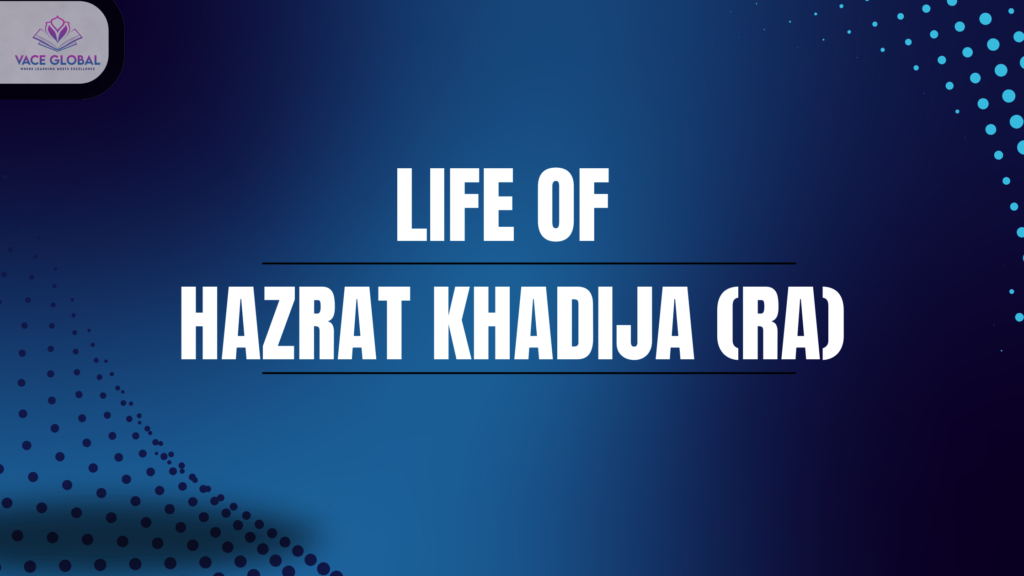
Hazrat Khadija bint Khuwaylid (RA) holds an unparalleled status in Islamic history. As the first wife of Prophet Muhammad (PBUH), the first person to embrace Islam, and a woman of immense wisdom, wealth, and character, her life serves as a guiding light for Muslims, particularly women worldwide. Hazrat Khaija RA is a very reputable and repeated topic in the O-level Islamiyat syllabus. Whether you are a student of Edexcel or Cambridge, Hazrat Khadija RA is an important topic to prepare for O-level exams. Who was Hazrat Khadija (RA)? Hazrat Khadija RA was a merchant and a successful businesswoman of Islamic history. She was the first wife of Prophet Muhammad (PBUH). She was born into the Quraysh tribe, and her noble personality was well-known within her tribe. Learning Islamiat with authenticity holds immense importance. Even if you need to extend your O-levels over three years, never compromise on the resource and authenticity of Islamic teachings. Also, it increases your chances of earning an O-level scholarship. Quick Facts about Hazrat Khadija RA: Some quick facts about the life of Hazrat Khadija RA are below: Facts Details Full Name Khadījah bint al-Khuwaylid Also Known As Khadīja al-Kubra Born c. 554, Makkah, Hejaz, Arabia (present-day Saudi Arabia) Died 10 Ramadan, BH 3 (c. 619, aged 64–65), Makkah, Saudi Arabia Resting Place Jannat al-Mu’alla, Makkah Known For First wife of Muhammad (PBUH) Title(s) Ameerat-Quraysh, al-Tahirah Spouse Muhammad ibn Abdullah Children Sons: Qasim, AbdullahDaughters: Fatima, Zainab, Ruqayya, Umm Kulthum Parents Father: Khuwaylid ibn AsadMother: Fatimah bint Za’idah Relatives Grandsons: Hasan ibn Ali, Husayn ibn Ali, Abd Allah ibn Uthman, Ali ibn Abi al-AsGranddaughters: Umama bint Abi al-As, Zaynab bint Ali, Umm Kulthum bint Ali Notable Family Members Spouse: Muhammad (PBUH)Daughter: Fatimah Hazrat Khadija (RA)’s Business: The father of Hazrat Khadija RA, Khuwaliyd Ibn Asad, was a merchant by profession. He was also a noble leader. She adopted this occupation from her father. She was a very successful merchant of her time. It is said that her caravan used to be equal to the total caravans of all traders of Quraysh. She was given many titles, which include: She used to feed and clothe the poor, assisted her relatives financially and provided money to the poor relatives for marriage purposes. Hazrat Khadija (RA) never used to travel with her trade caravans. She employed men to trade in her place for a commission. She hired Hazrat Muhammad (PBUH) for her trade in Syria when he was in his early twenties. Hazrat Khadija (RA)’s Marriage: Different sects of muslims have different beliefs on this controversial topic of her marriage. According to the Shia community, her marriage to Hazrat Muhammad PBUH was the first marriage of her life. There were no records of marriages before that. Whereas, the Sunni community believes Hazrat Khadija RA married three times in her life and had children from that marriage. Her marriage to Hazrat Muhammad (PBUH) is of the utmost importance for Muslims. Hazrat Khadija RA met Hazrat Muhammad PBUH when she hired him for trade in Syria. She was impressed with the honesty and nobility of Hazrat Muhammad PBUH. According to various articles, she contacted her friend Nafisa to approach the Prophet (PBUH) with a marriage proposal. Prophet PBUH hesitated as he had no means of supporting a wife, but then Nafisa insisted that he consider a marriage to a woman who had the means to provide for herself. Holy Prophet PBUH agreed to meet Hazrat Khadija RA. After this meeting, Hazrat Muhammad (PBUH) contacted his uncle, and a formal proposal was sent to her. Khadija’s uncle accepted the proposal, and the marriage was subsequently arranged. At the time of marriage, Hazrat Muhammad PBUH was in his early 20s, whereas Hazrat Khadija RA was at the age of 40 years. Children of Hazrat Khadija (RA): They had no sons who survived childhood. According to the Sunni community, they had four daughters: Their first son was Qasim, who passed away before his third birthday. Then Hazrat Khadija RA gave birth to four daughters. Lastly, they had a son, Abd Allah, who didn’t survive his childhood. Important life events of her life: When Hazrat Jibral AS came with his first revelation of the Quran upon Muhammad PBUH, it is believed that Hazrat Khadija RA was the first one to accept and believe in the truth. Hazrat Muhammad PBUH) Returned to Hazrat Khadija RA in a state of terror and fear, she was the one who calmed down and stood by Hazrat Muhammad PBUH. She accepted Islam after that. Her faith never wavered, even in the face of immense challenges. Her support gave the Prophet (PBUH) the strength to continue spreading the message of Islam. After believing in the first revelation to Muhammad PBUH, Hazrat Khadija RA accepted Islam and became the first Muslim. She stood by the tough times of the life of the Holy Prophet PBUH. When nobody believed in Muhammad PBUH, Khadija RA was the first to believe in Islam and all the subsequent revelations on the Holy Prophet PBUH. She was not only a believer in his mission but also his greatest source of emotional, financial, and moral support. She has set an example for Muslim women to follow. Death of Hazrat Khadja RA: Hazrat Khadija RA passed away in Ramadan in 619 CE in Mecca, now located in modern-day Arabia. This was 10 years after the reveal of Prophethood. Hazrat Muhammad PBUH called this tenth year as “The Year of Sorrow”. Hazrat Khadija RA was said to e at the age of 65 at the time of her death. To learn more about the historical key personalities of Islam, ecplore the Cambridge O-level syllabus for Islamiyat. Lessons for women: Hazrat Khadija (RA) remains a powerful role model for Muslim women. Her qualities of integrity, leadership, business sense, piety, and devotion set the standard for what it means to live a life of purpose and service to Allah. She balanced worldly success with spiritual strength, showing that a woman can be both
An Overview of A-level Economics Syllabus

The A-level economics syllabus is an advanced version of the Economics syllabus that O-level students study. It is more in-depth, more complex and more difficult than the O-level subjects. The A-level economics syllabus serves as a roadmap for students who wish to develop a deeper understanding of how economies function on both a national and global scale. Students who want to pursue Economics in their career select A-level economics out of other elective A-level subjects. Whether you’re planning to pursue economics at university or just want to strengthen your analytical skills, understanding the syllabus is the first step toward success. This guide provides a complete overview of the A-level economics course, exam structure, important topics, and resources to help you excel. What is A-level economics? A-level economics introduces students to the mechanisms behind consumer behavior, market structures, government policies, and international trade. It is ideal for learners interested in politics, business, or social sciences, and those aiming for careers in finance, policymaking, or research. It helps build analytical thinking and data interpretation skills, two areas highly valued in academic and professional settings. Unlike the Cambridge O-level syllabus, which lays the foundation, A-level economics delves deeper into real-world economic theories and models. Understanding the exam structure: The A-level exam format varies slightly depending on the exam board, but generally includes a combination of: Most boards assess students over two years—AS (first year) and A2 (second year). Knowing the paper structure allows you to tailor your revision more effectively. A strong grasp of these structures is particularly helpful when transitioning from the O-levels over three years academic approach. Cambridge International A-level economics syllabus: Cambridge International’s A-level Economics syllabus (9708) is widely recognized across the globe. Below is a list of Cambridge A-level economics syllabus: AS Level Topic No. AS Level Topics A-Level Topic No. A-Level Topics 1.1 Scarcity, choice and opportunity cost 1.1–6.5 All AS Level Topics 1.2 Economic methodology 7.1 Utility 1.3 Factors of production 7.2 Indifference curves and budget lines 1.4 Resource allocation in different economic systems 7.3 Efficiency and market failure 1.5 Production possibility curves 7.4 Private costs and benefits, externalities and social costs and benefits 1.6 Classification of goods and services 7.5 Types of cost, revenue and profit, short-run and long-run production 2.1 Demand and supply curves 7.6 Different market structures 2.2 Price elasticity, income elasticity and cross elasticity of demand 7.7 Growth and survival of firms 2.3 Price elasticity of supply 7.8 Differing objectives and policies of firms 2.4 The interaction of demand and supply 8.1 Government policies to achieve efficient resource allocation and correct market failure 2.5 Consumer and producer surplus 8.2 Equity and redistribution of income and wealth 3.1 Reasons for government intervention in markets 8.3 Labour market forces and government intervention 3.2 Methods and effects of government intervention in markets 9.1 The circular flow of income 3.3 Addressing income and wealth inequality 9.2 Economic growth and sustainability 4.1 National income statistics 9.3 Employment/unemployment 4.2 Introduction to the circular flow of income 9.4 Money and banking 4.3 Aggregate Demand and Aggregate Supply analysis 10.1 Government macroeconomic policy objectives 4.4 Economic growth 10.2 Links between macroeconomic problems and their interrelatedness 4.5 Unemployment 10.3 Effectiveness of policy options to meet all macroeconomic objectives 4.6 Price stability 11.1 Policies to correct disequilibrium in the balance of payments 5.1 Government macroeconomic policy objectives 11.2 Exchange rates 5.2 Fiscal policy 11.3 Economic development 5.3 Monetary policy 11.4 Characteristics of countries at different levels of development 5.4 Supply-side policy 11.5 Relationship between countries at different levels of development 6.1 The reasons for international trade 11.6 Globalisation 6.2 Protectionism 6.3 Current account of the balance of payments 6.4 Exchange rates 6.5 Policies to correct imbalances in the current account The Cambridge board’s emphasis on global issues makes it ideal for students aiming to study international economics or work in multinational sectors. Many O-level and IGCSE private candidates choose this board due to its flexibility and global relevance. Other boards, such as Edexcel and AQA, have different syllabus outlines. Key topics you must know: Here’s a breakdown of the core A-level economics topics that appear across most syllabi: Mastering these themes prepares you for success in exams. Also, it builds your ability to analyze current economic issues, something that isn’t typically covered in the O-level physics syllabus or other science-based subjects. Essential resources for A-level economics students: Whether you prefer print or digital, having access to reliable materials can significantly enhance your learning. Top recommendations include: Online platforms often complement these with videos and quizzes. The Benefits of online tutoring in Pakistan include access to digital resources and one-on-one academic support. Past papers and revision material: Solving past papers in level economics is one of the most effective ways to prepare. They help you: Many students also use an economics A-level revision guide to summarize theories, models, and key definitions. Comparing Edexcel vs Cambridge resources helps identify which style suits your learning preference better. How to choose tuition and support: Many students benefit from additional guidance through a level economics tuition. The right A-level tutor can clarify tough concepts, provide exam strategies, and offer regular feedback. When choosing a tutor, look for experience with your exam board and familiarity with the exam structure. If you had an O-level tutor previously, you’ll appreciate the continuity and academic support they can offer as you move into A-levels. Tuition is especially helpful for students aiming for university scholarships or bridging the difference between O-level and A-level standards. Conclusion: Mastering the A-level economics involves more than just memorizing definitions; it’s about understanding how economies work and applying that knowledge critically. Whether you’re aiming to excel in your exams or build a career in economics, starting with a solid understanding of the syllabus and utilizing high-quality resources is crucial. If you’re a high-achieving student, exploring options like an O-level scholarship and then progressing into A-level economics can set you on a path to academic excellence and professional growth. Enroll with the expert A-level economics tutors at VACE
How To Use Examiner Reports To Your Advantage
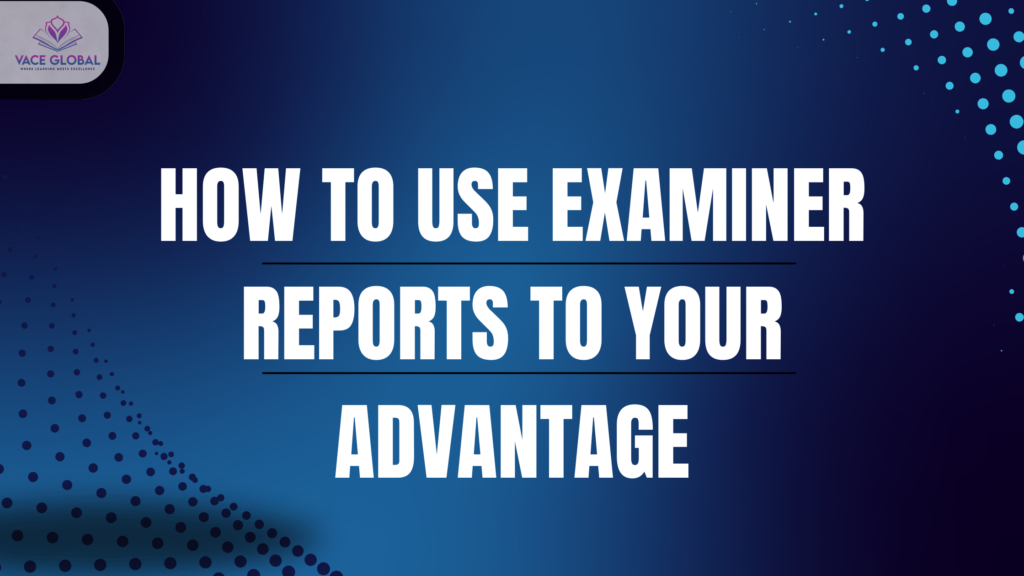
Exams can be stressful, especially when you’re unsure of what the examiner really expects. That’s where the examiner’s report becomes an invaluable resource. Whether you’re an O-Level, A-Level, or IGCSE student or a private candidate, understanding examiner feedback can give you the edge you need to excel in your exams. In this guide, we’ll break down what an examiner report is, how it’s structured, why it’s essential, and how both students and educators can use it to boost academic performance. What is an Examiner report? An examiner’s report is an official document published by examination boards after each exam series. It provides a detailed summary of how students performed on each question, highlighting common mistakes, areas of strength, and specific recommendations from the examiner’s perspective. Unlike a marking scheme, which only outlines the distribution of marks for answers, an examiner report offers real insight into examiner expectations and student responses during the actual marking process. Who writes examiner reports? Examiner reports are usually written by senior examiners, experienced professionals who lead the marking process. They are released shortly after results are published, typically once the grading and review process is finalised. Depending on the exam board (e.g., Edexcel vs Cambridge), the format, tone, and depth of these reports can vary. Some are highly detailed, while others provide brief commentary. Why do examiner reports matter? These reports are more than just summaries; they are powerful learning tools. Here’s why: For students aiming for high performance, this feedback can be the difference between a B and an A*. Typical structure of an examiner’s report: Understanding the structure helps you make better use of the information. Most examiner reports include: How Students Should Use Examiner Reports: Whether you’re preparing with a school teacher or working with an O-level tutor or A-level tutor, examiner reports can be integrated into your revision plan effectively. Here’s how: When combined with O-level past papers and other study resources, examiner reports offer a more targeted and intelligent revision method. How Educators and Tutors Can Leverage Examiner Reports: For educators, examiner reports are goldmines of diagnostic information. They can: By reviewing these reports regularly, educators can ensure their teaching methods align closely with what the exam boards are looking for. Where to Find Examiner Reports: You can typically find examiner reports on the official websites of exam boards like Cambridge International, Edexcel, or AQA. Many schools also distribute these directly to students. If you’re a private candidate or an independent learner, you can find them through educational forums, revision websites, or by consulting your school or tutor. Reliable resources of Examiner reports: Pro tip: After checking your IGCSE results, download the latest examiner report for each subject to understand exactly how others performed and what examiners expected. Tips for Effective Use: Conclusion: An examiner report is not just a post-exam document—it’s a roadmap to exam excellence. By understanding examiner expectations and learning from past mistakes, students can refine their exam techniques and maximize their scores. Whether you’re tackling science subjects, humanities, or languages, integrating examiner feedback into your study routine can drastically improve your academic outcomes. If you haven’t explored these reports yet, now is the perfect time to start. Your next exam success could depend on it. Enrol with VACE Global to get support from expert tuition teachers to help you learn and examine examiners’ reports. FAQs 1. What is the difference between an examiner’s report and a marking scheme? A marking scheme outlines how marks are awarded for each question, while an examiner report provides detailed commentary on how students performed, common mistakes, and examiner recommendations for improvement. 2. Are examiner reports available for all subjects and exam boards? Most major exam boards like Cambridge, Edexcel, and AQA release examiner reports for core subjects after each exam session. However, not all subjects or series may have publicly available reports. 3. How can I use examiner reports to improve my exam preparation? You can use examiner reports to understand common mistakes, refine your answering technique, and align your responses with examiner expectations. They’re especially effective when used alongside past papers and guided feedback. 4. Can private candidates or homeschoolers access examiner reports? Yes, examiner reports are usually available for free on official exam board websites, making them accessible to private candidates, homeschoolers, and independent learners. 5. When are examiner reports usually released? Examiner reports are typically released shortly after exam results are published, often within a few weeks. You can find them on the exam board’s website or request them through your school or tutor.
Understanding Marking Schemes: A Guide for O-level & IGCSE Students
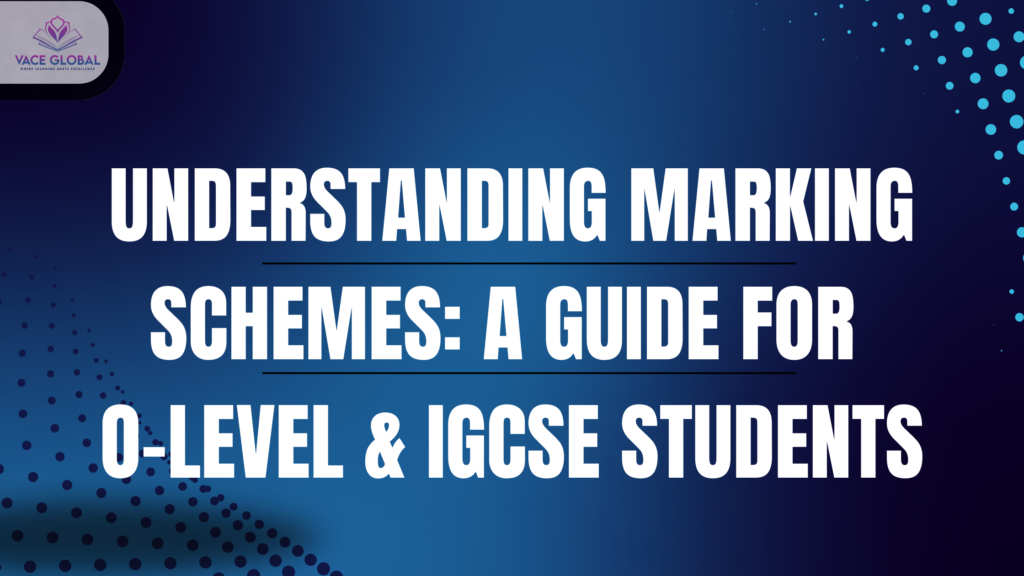
When preparing for exams, many students focus heavily on textbooks and notes but overlook one crucial resource: marking schemes. These are more than just scoring guides; they offer insight into how examiners think, what they reward, and where students often lose marks. Whether you’re aiming for an A* or just trying to pass, understanding marking schemes can make a huge difference. What are marking schemes? Marking schemes are official documents provided by exam boards that detail how marks are awarded for each question in an exam. They serve as a blueprint for examiners to ensure consistency and fairness when evaluating student responses. Each marking scheme outlines acceptable answers, allocated marks, and sometimes even notes on common mistakes or misconceptions. Why are marking schemes important in O-level and IGCSE grading? In subjects such as Mathematics, Sciences, or Humanities, answers can vary in structure and depth. Marking schemes help maintain a standardized grading system by clarifying what qualifies as a correct answer. For O-Level and IGCSE students, this transparency is crucial, it allows them to understand how to score well and avoid losing marks for incomplete or poorly structured responses. These schemes are closely aligned with the Cambridge O-level syllabus and are updated in accordance with curriculum changes, ensuring that students are assessed on relevant and current content. What Insights do you get from a marking scheme? The marking scheme is not just a scoring guide; it’s a window into the examiner’s mind. By carefully reviewing them, students gain valuable insights that help them structure their answers more effectively. By understanding how marks are awarded, students can learn a more strategic approach to answering questions. Some key insights that students gain from: By regularly using marking structures with practice questions, you develop a more exam-oriented mindset, one that boosts precision, confidence, and performance. How are marking schemes crafted? Experienced examiners design marking schemes in collaboration with the team that creates the question papers. They begin developing a scheme alongside the paper, anticipating how students might respond. After the first round of exam marking, initial results are reviewed, and marking schemes are refined to include a broader range of acceptable answers, ensuring fairness across diverse student interpretations. The process also involves standardization meetings where examiners are trained to mark consistently according to the final scheme. How should O-level students use them? Marking schemes are not just for teachers or examiners; they are also valuable tools for students. Here’s how O-Level students can use them effectively: For instance, students preparing with an O-level tutor can use marking structure during mock sessions to simulate real exam conditions. Benefits of using marking schemes for exam preparations: Using marking schemes during your revision process offers several advantages: Marking schemes are especially beneficial when used in conjunction with O-level past papers. Together, they create a powerful feedback loop for improvement. Where can I find an authentic O-level marking scheme? You can access official schemes through your school, your teacher, or your exam board’s website (like CAIE or Edexcel). Many reputable tutoring platforms and revision websites also offer downloadable past papers, complete with marking schemes. Reputable sites to find: If you’re enrolled in a subject like the O-level chemistry syllabus or the O-level Islamiyat syllabus, you can ask your teacher for paper-specific schemes. These resources are essential for aligning your preparation with real-world grading standards. Some online resources also cater to students doing O-levels over three years, ensuring that each stage of the extended curriculum is supported with matching assessment tools. Conclusion: Understanding and utilizing marking schemes can transform how you approach O-Level and IGCSE exam preparation, especially for private candidates. Rather than merely studying hard, you study smart by aligning your answers with the examiner’s expectations. Whether you’re aiming for an O-level scholarship or simply looking to boost your grades, mastering the use of marking schemes will give you a solid competitive edge. The best online tutor in Pakistan can help you properly incorporate marking schemes and past papers in your exam practice and preparation. Enroll with the expert tuition teachers of VACE Global to get started with your O-level journey. FAQs: Q1: Can marking schemes change every year? Yes, marking schemes are updated annually to match changes in the syllabus and to reflect better practices in assessment. Q2: Are marking schemes the same across exam boards? No. Each exam board, such as Edexcel or Cambridge, develops its marking schemes based on its curriculum and assessment style. Q3: Can I rely solely on marking schemes to prepare for exams? While they are excellent tools for revision, they should be used in conjunction with other study materials, such as class notes, textbooks, and feedback from teachers or tutors.
Role of Feedback in Online Tutoring
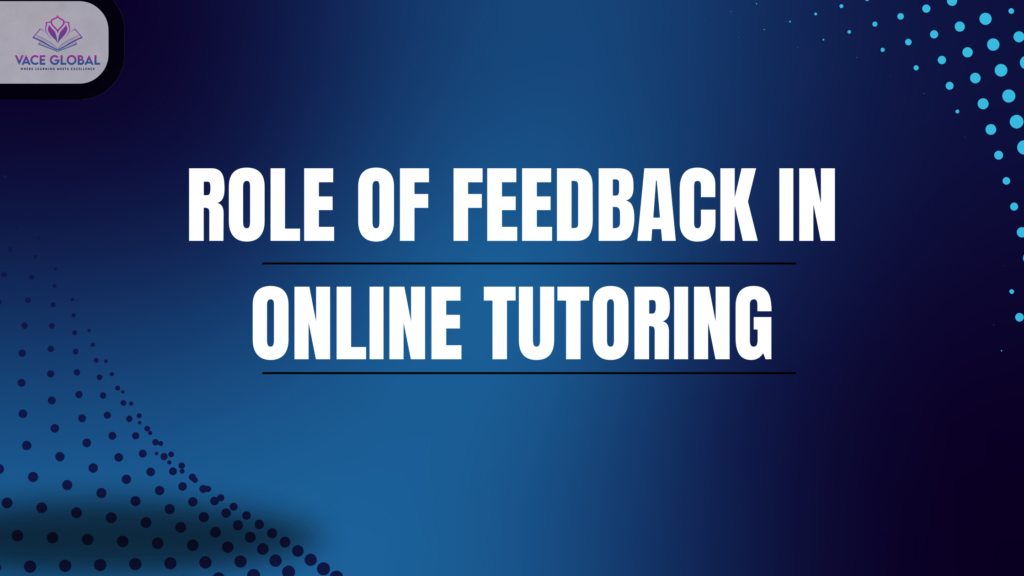
In any work or school environment, feedback is an important element. It is a very useful tool for evaluating whether a person is progressing in the right direction or has areas that need improvement. Therefore, even in an online tutoring platform, feedback is the most significant evaluation tool. They provide an opportunity to give and receive valuable advice. The role of feedback in online tutoring is substantial. Whether you are an O-level tutor or the best A-level tutor in Pakistan, feedback can always benefit. Online tutoring in Pakistan faces numerous challenges and criticism. Developing a regular quality check system through feedback from students and parents is beneficial. Likewise, getting input from a tuition teacher can benefit a child in evaluating their academic progress. This blog will explore the role of feedback in online tutoring and its benefits. What is feedback in online tutoring? The term “feedback” is becoming an integral part of our environment, particularly in the business world. This word roots from the term “feed,” which means to nurture or provide. Feedback in online tutoring can go two ways: The more the benefits of online tutoring are, the more valuable feedback in online tutoring becomes. Feedback can be a form of recommendations for other students regarding an online tutoring platform. Feedback provides useful advice, an appreciation post, or in some cases, a reality check to both the institute and the student. Why do you need feedback in Online tutoring? In the world of online education, feedback serves as a vital bridge between teaching and learning. It not only helps students understand their strengths and areas for improvement, but also gives tutors a clearer view of how well their strategies are working. This two-way communication ensures that learning stays on track and tailored to individual needs. One of the key advantages of feedback in online tutoring is its role in tracking progress and sustaining motivation. Students often study in isolation, especially those who are O-level and IGCSE private candidates, aiming to achieve an A-level scholarship, making consistent and constructive feedback even more essential. It provides a sense of direction and achievement, which is important for learning. Moreover, feedback supports the growth of both tutors and students. Tutors can adapt their teaching methods based on how well the student responds, while students gain insights into how to improve academically. It encourages continuous improvement and a more personalized educational journey. Reasons You Need Feedback in Online Tutoring: Types of feedback in online tutoring: Feedbacks vary for every person. It is neither unique nor one-size-fits-all. Feedback can be expressed in different ways. The two types of feedback are: In addition to these basic forms of feedback, there is a deeper level to feedback and evaluations: Written, verbal, and automated (AI-generated) feedback all play key roles in online settings. Written comments are useful for assignments like those in the Cambridge O-level syllabus, while verbal feedback during live sessions helps clarify concepts on the spot. Automated feedback from learning platforms gives immediate responses to quiz results or multiple-choice questions. There’s also a difference between real-time feedback (given during the session) and delayed feedback (provided after an activity or assignment). While real-time feedback can quickly correct misunderstandings, delayed feedback is often more detailed and reflective of the situation. Who can provide feedback in online tutoring? In an online tutoring setup, feedback is a shared responsibility that flows in multiple directions. While tutors are typically the ones offering guidance, students and even parents also play a valuable role in shaping a productive learning experience. This collaborative approach ensures that online tutoring remains adaptive, effective, and student-centered. Students can give feedback to tutors through peer reviews, ratings, or honest communication about what works for them. Their input helps tutors fine-tune their teaching methods and improve session delivery. For example, if a student struggles with the O-level physics syllabus, their feedback helps the tutor adjust explanations, add visuals, or recommend better resources. Tutors provide feedback to students in the form of written comments, lesson summaries, and performance insights. This helps students focus on what they can improve and where they are excelling. Feedback becomes especially useful when preparing for subjects like the O-level chemistry syllabus, where consistent guidance and effective study tips can significantly boost academic performance. Parents also contribute to feedback by observing changes in their child’s study habits, confidence, and motivation. Their input supports the tutor in modifying lesson plans and tracking progress, which is particularly helpful for those pursuing O-levels over three years or managing flexible learning paths. Why does feedback in online tutoring matter? In the digital classroom, feedback is more than just a routine comment, it’s a key element that drives improvement, clarity, and motivation. Without physical presence, students often rely entirely on feedback to know whether they’re on the right track, especially when preparing for complex syllabi. Feedback in online tutoring fills the communication gap between tutors and students by providing clarity on what’s working and what needs improvement. Whether you’re tackling a tricky math topic or working on an essay, feedback helps pinpoint exact areas that need attention. It also builds confidence. Positive reinforcement motivates students to stay consistent, while constructive criticism equips them with actionable steps to do better. This balance is essential, particularly for students studying independently or managing academic pressure after receiving their IGCSE results. Moreover, feedback supports personalized learning. Every student learns differently, and consistent feedback allows tutors to adapt their teaching methods. Key Reasons Feedback Matters in Online Tutoring: How can you improve through feedback? One of the biggest advantages of online tutoring is the ability to grow through consistent feedback. But how to improve through feedback? It starts with a mindset that values learning over perfection. Accepting constructive criticism helps students grow academically and personally. Instead of seeing feedback as a failure, students should view it as a roadmap to improvement, especially when preparing for challenging subjects like the sciences in the Cambridge O-level syllabus. Setting actionable learning goals based on feedback keeps students focused
The Significance of Urdu Past Papers for Exam Preparation
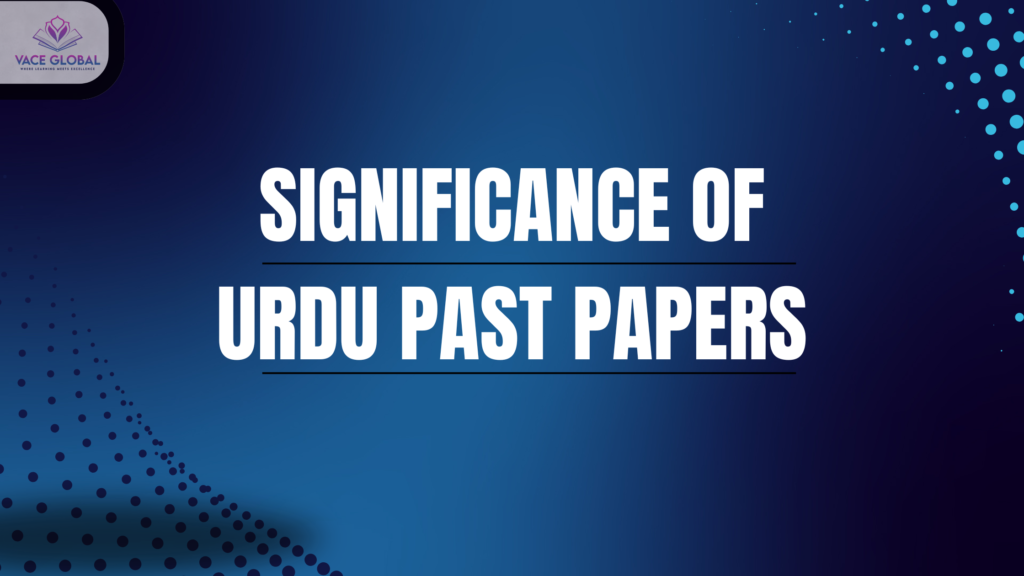
Preparing for Urdu exams can feel overwhelming, especially when balancing it with other O-level subjects like the O-level chemistry syllabus and the O-level Islamiyat syllabus. One of the most effective tools students can use for revision is the Urdu past paper. Whether you’re studying for your Cambridge O-Level syllabus or aiming high in A-Level, Urdu past papers offer valuable insight into exam structure, question trends, and time management. What are Urdu past papers? An Urdu past paper is a previously administered exam paper from a particular board, such as Cambridge or local examination boards. It helps students get familiar with the format, structure, and types of questions asked. Students preparing for the Urdu syllabus often rely on these papers for accurate exam practice. Past papers are available for both Urdu past papers O-level and Urdu past paper A-level, making them a useful resource regardless of your academic level. How to use Urdu past papers effectively? Using Urdu past papers effectively goes beyond just solving questions; it’s about strategic preparation. These papers help you get familiar with the exam format, common themes, and expected answer structures. By consistently reviewing past paper trends, you can spot frequently tested topics, improve your time management, and reduce exam-day anxiety. To maximize the value of past papers, follow these steps: These techniques are essential when asking how to use Urdu past papers for consistent improvement. Benefits of using Urdu past papers: There are several advantages of past papers in your exam preparation strategy: Tips to incorporate Urdu O-level past papers in your O-level syllabus: Urdu Past Papers for O-Level vs A-Level: What’s the Difference? The difference between O-level and A-level Urdu lies in the complexity and depth of the syllabus: Understanding this difference is key when comparing Urdu past papers O-level and Urdu past paper A-level. You may also want to explore our comparison of Edexcel vs Cambridge if you’re unsure which board suits your study goals. Where to Find Reliable Past Papers Online: Students can access Urdu past papers from various sources: Look for papers that include marking schemes for a complete understanding of examiner expectations. Marking scheme and Examiner reports help students understand what the examiner wants from a particular answer. Conclusion: Utilizing Urdu past paper resources is a proven method to refine your skills, master exam techniques, and enhance your confidence. Enroll with a trusted online tutor in Pakistan with expert Urdu teachers to easily incorporate Urdu past papers in your preparation journey and get the maximum benefits from them. For those just beginning their academic journey, carefully choosing O-level subjects and exploring the Cambridge O-level syllabus can make all the difference. If you’re preparing to transition to A-level subjects, consider how past paper practice will continue to serve you well. FAQs: Q1: How can I start preparing with past papers?Start by downloading past papers and marking schemes. Set a weekly schedule and stick to it. Practice them year by year. It is suggested to use a recent paper. Q2: How many years’ worth of past papers should I practice?Aim for at least 5 years of Urdu past papers, O-level or A-level, depending on your level. Q3: Are Urdu past papers enough to secure top grades?While highly beneficial, you should combine them with your textbooks, class notes, and tutoring for best results. Q4: Do local board students also benefit from past papers?Yes, students can use Pak studies past paper class 10 and other subjects’ past papers to complement their study plan. Q5: Can online tutoring help with Urdu preparation?Absolutely! The benefits of online tutoring in Pakistan include flexibility, expert guidance, and personalized feedback.
A complete guide to Cambridge O-level Pakistan Studies
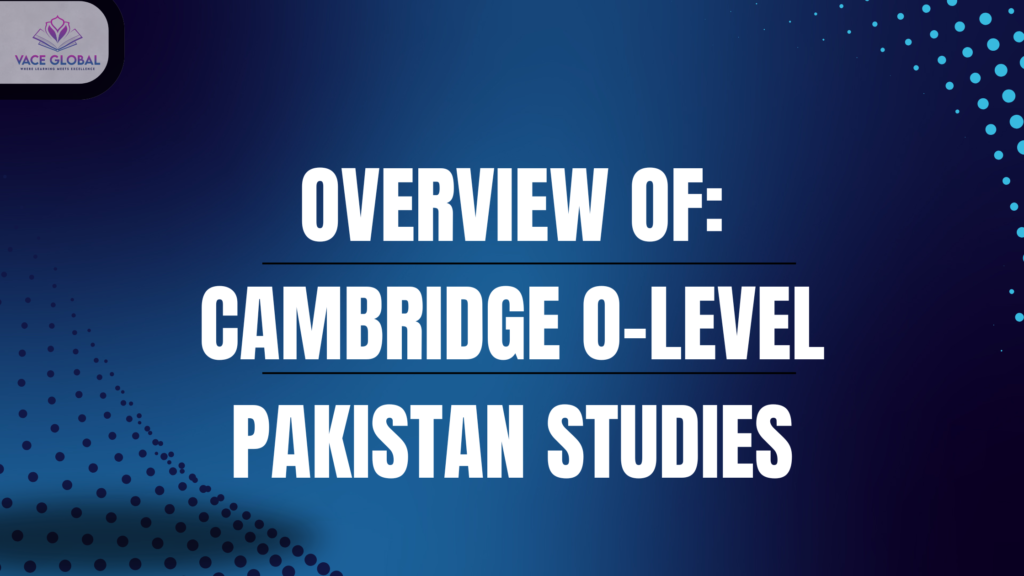
The Cambridge O-Level Pakistan Studies syllabus is one of the most important subjects for students in Pakistan who are pursuing their O-levels. It not only helps students understand the historical and geographical development of the country but also strengthens their national identity. If you’re planning to take Pakistan Studies as one of your O-level subjects, this guide will walk you through everything from the syllabus and exam structure to tips and preparation strategies. What is the Cambridge O-level Pakistan studies? Pakistan Studies at the O-level is a subject offered under the Cambridge O-Level syllabus. Officially known as O-Level Pakistan Studies 2059, this subject is designed to provide students with a comprehensive understanding of Pakistan’s history, culture, environment, and development. It helps build critical thinking and analysis skills, which are essential for both academic and civic growth. Students often pair it with subjects like the O-level Islamiyat syllabus and the O-level chemistry syllabus to complete the core requirements. Cambridge O-Level Pakistan Studies Syllabus Breakdown The Cambridge O-Level Pakistan Studies syllabus is divided into two main components: History and Geography. Paper 1: History and Culture of Pakistan Paper 2: The Environment of Pakistan This division allows students to explore both historical and geographical perspectives, making it a well-rounded subject. The geographical component includes the climate of Pakistan, the Physical features of Pakistan, the rivers of Pakistan, the deserts of Pakistan, the rivers of Balochistan and so on. Whereas, the historical component includes the historical events of Pakistan. The exam structure of O-level Pakistan studies: The subject includes two compulsory written papers: Both papers are structured with short-answer questions and longer, essay-type questions. The 6-mark question is the main highlight of the Pakistan studies paper. Understanding the format is crucial for scoring well. Students can benefit from hiring an experienced O-level tutor to get familiar with question patterns and answer writing techniques. Recommended Resources for Cambridge O-level Physics Syllabus Finding the right study material is essential. Some of the most widely recommended books for Cambridge O-Level Pakistan Studies include: These books, combined with personalized tutoring or online tutoring in Pakistan, can create a strong foundation. How to Prepare for Pakistan Studies (2059) To excel in O-level Pakistan Studies 2059, consider the following strategy: Importance of Past Papers for Exam Practice: Practicing with the Cambridge O-Level Pakistan Studies past paper is one of the most effective ways to prepare for the final exams. It helps students: Whether you’re studying independently or with an O-level tutor, incorporating past papers into your schedule is vital. Students aiming for an O-level scholarship should particularly focus on solving past papers to ensure high grades. Tips for Scoring High in Pakistan Studies: Here are some smart tips to boost your performance: Students also often consider whether to continue with Cambridge or switch to other boards. If you’re unsure, check out our comparison: Edexcel vs Cambridge. Conclusion: Enroll with the best Pakistan studies tutors at VACE Global to fulfill your dream of an O-level Scholarship. Start your preparation early and build a better grasp on both History and Geography. These theoretical subjects can help you boost your chances of a scholarship in the future. FAQs Q1: What is the difference between O-level and A-level Pakistan Studies?A1: The difference between O-level and A-level lies in the depth and analytical level. A-level covers broader topics in greater detail and requires more critical thinking. Q2: Can I find a Cambridge O-Level Pakistan Studies book PDF online?A2: Yes, many websites and official Cambridge resources offer downloadable PDFs. Make sure to use reliable sources. Q3: How many past papers should I practice before the exam?A3: At least the past 5 years’ worth of Cambridge O-Level Pakistan Studies past paper to get a complete understanding. Q4: Is it helpful to use Class 9 and 10 local Pak Studies books?A4: Yes, using Pak Studies book class 9 and Pak Studies past paper class 10 can reinforce your base knowledge
